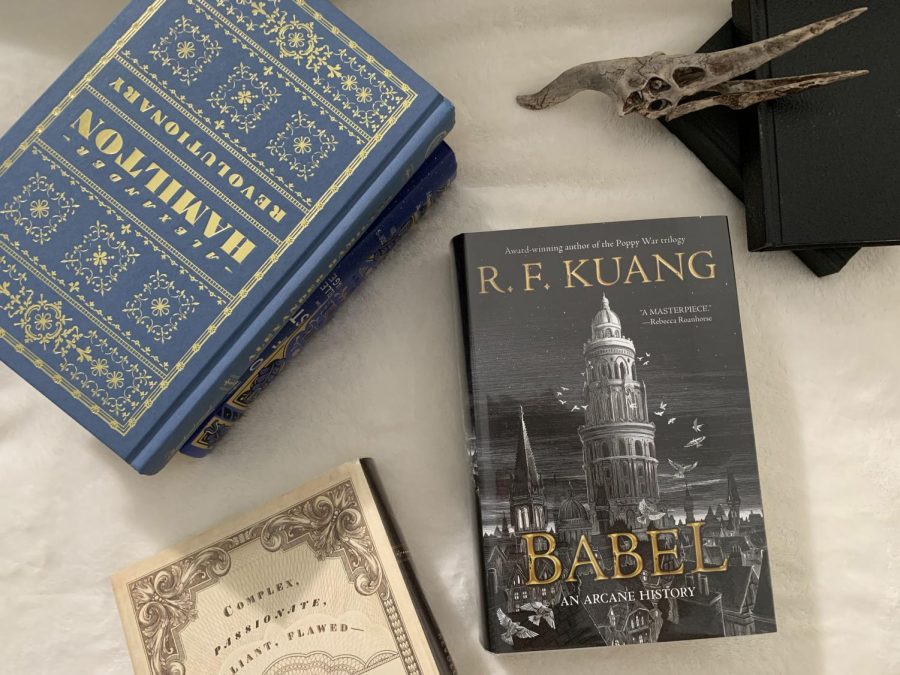Babel, written in glistening silver
“Babel, or the Necessity of Violence” by R. F. Kuang
January 30, 2023
Babel: Or the Necessity of Violence: An Arcane History of the Oxford Translators’ Revolution by R. F. Kuang gave me writer’s block. This book reads like the rise and fall of great cities and entire civilizations, its beauty found in the highs and lows of academia, the gray and rainy daytime of Oxford, and the glistening magic of silver working within the walls of Babel. Though beautiful, do not mistake that beauty for a fantastical tale of adventures and joyous gallivanting around the globe. Babel is a story of colonialism in a world so similar to our own that it feels entirely possible that the greed, entitlement, and pain illustrated throughout were extracted from reality.
Kuang created a world where magic manifests itself in silver working, a method of engraving words into silver bars allowing the user to alter reality. Like in our world everything is treated as a commodity, a resource to be bought and traded across the globe. Silver is only capable of such feats with the help of the world’s languages. By tracing the connections and meanings between words across cultures and countries power is generated through the links between them. But this incredible power to improve lives and help countless is controlled by those who sell and market it at top dollar, as a result only the richest and most powerful people and countries have steady access to this commodity. Not to mention, silver requires a fluent speaker of the languages engraved upon it to work, so translators are necessary to work the magic. In this world, England has a monopoly on silver creating a gargantuan power divide between them and the other countries of the world.
A tragic tale of friendship and camaraderie rivaling Shakespeare’s own. We follow Robin Swift and his posse of friends Victore, Ramy, and Letty. Each of them is a stranger to Oxford’s academic world, typically occupied by white men. The four explore this new world of study and adventure as they learn to work the magic of silver, eventually joining their professors in working in this new frontier. But, once the rose-tinted glasses are gone Robin is pulled into a world of secret societies and revenge, revealing the dark underbelly of the academic world and the fast-acting consequences of colonialism. Robin, Ramy, Letty, and Victore are thrown into the midst of a storm as they navigate the treachery of the world and their friendship.
Kuang takes literature to the next level with Babel; its footnotes, literary references, and characters being a few of the things that went completely right with this work. Set in Oxford college I was delighted to find that Kuang did not shy away from including scenes of the characters in school, studying, or holding late-night study sessions for exams. All things that make academic life what it is are included within the book a perfect balance to the action-packed secrets and scheming that dually occupies Babel’s pages. Students struggling to balance their “adventures” with their school life was a massive contrast to the teenage main character that never has to worry about school or responsibilities that teenagers have to deal with. Robin and his friends attend lectures, study, and live their day to day lives, yet Kuang kept me intrigued and interested the whole time. I wanted to read more about the life of these Oxford students and their studies for their finals. Both the academic and the secret society plots existed in harmony complementing each other perfectly.
“We are foreign because this nation has marked us so.”
Babel has a style incomparable to other works of literature, Kuang blends the common tongues scattered throughout Britain with the formal academic language of the colleges perfectly. In a book where language is critical, the usage of it from character to character works perfectly. Interactions don’t seem forced or flat and every word has weight creating a book with quotable lines around every corner. I was so easily able to fall in love with the language throughout the book including the few spots written in other languages. Seeing familiar Chinese characters throughout the book or being introduced to French and Latin words was a real treat, something that is so hard to work into a book seamlessly. A book about languages and translation is the perfect method of achieving that seamlessness. Kuang writes with extraordinary flourish and elegance, yet the writing does not topple into flowery nonsense. This balancing act gives Babel the same sophisticated air as the college campus it is set in, only adding to its beauty.
The inclusion of Britain’s relationships with other nations was an ingenious choice that characterizes colonialism as the grimy beast it is preying on those it deems savage or backward. Kuang handles this topic with incredible care, illustrating its lasting effects with scary accuracy, skirting true events that occurred within our history. Britain’s grasp on the world through the silver-working market is seen blatantly throughout the book not just with the ludicrous amounts of money Babel students are given as an allowance or the lavish parties Oxford throws on a regular basis but with the actions and ideologies of the professors and students occupying the college.
I could never write a review without acknowledging the existence of negative reviews of a book, and babel has no shortage of them. The inclusion of literature-heavy topics that are based on real works, the detail in which characters attend classes and lectures, and the choice to include every aspect of the academic life within the book found itself in quite a few negative reviews. Many say that they found it boring or frustrating having to read through dialogue that doesn’t involve the overarching plot, but instead a piece of literature that they were not familiar with. Many found it frustrating and felt that full understanding of the book hinged on how many of those literary references one could understand and relate to, making the book unfriendly to the casual reader. These concerns are not unfounded, Babel contained no shortage of literary references, from Ovid’s Metamorphoses to the philosophical works of Socrates and Plato Kuang seemed to run wild with the literature and classics within the book. Fitting to the theme though, that students of translation would study translated works of high regard. This heavy use of literature and emphasis on the “Oxford college” makes the book not for everyone. If someone finds that they don’t enjoy exposition, or the analysis of classic literature Babel might be a harder read to get through.
Babel is a hauntingly beautiful tale of life, friendship, and sacrifice. A David and Goliath story that merges itself with the world of academia. Babel has no shortage of delights for the reader that finds themselves enjoying the classics or wandering through magnificent libraries searching for their next great read. R.F. Kuang has written something unique and hypnotizing that shook me so deeply I couldn’t begin to form my thoughts on how I felt about this book.


